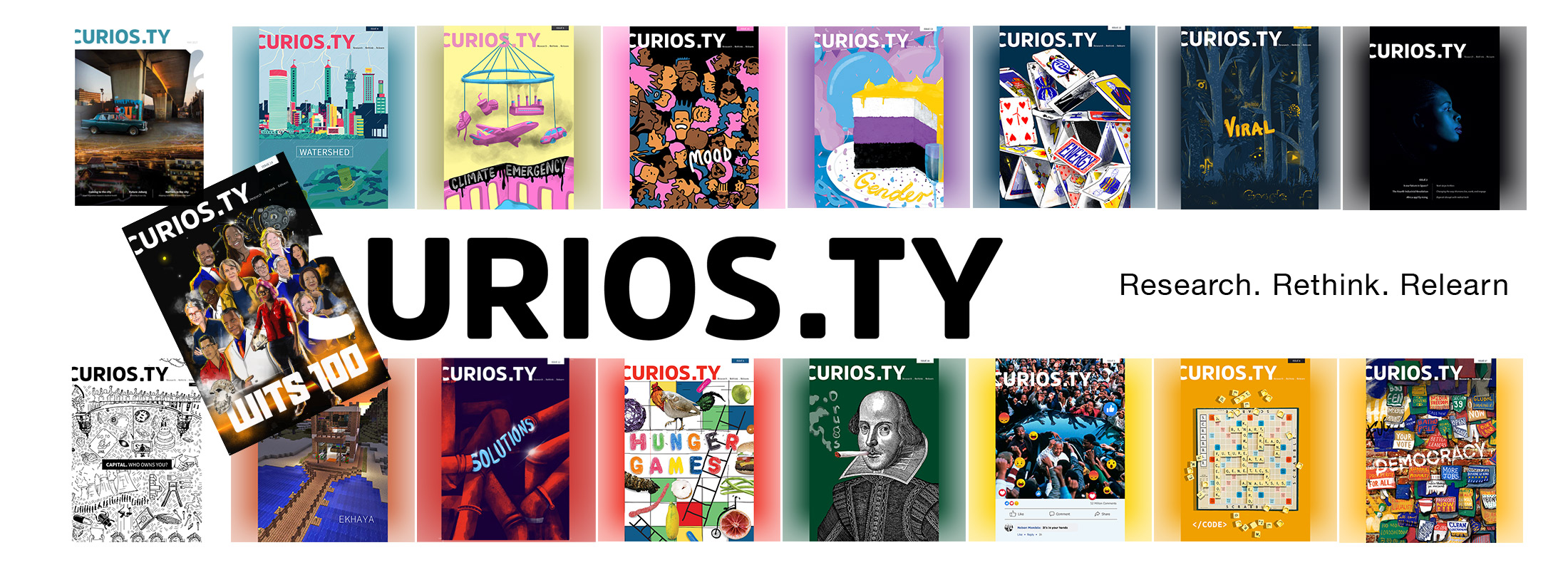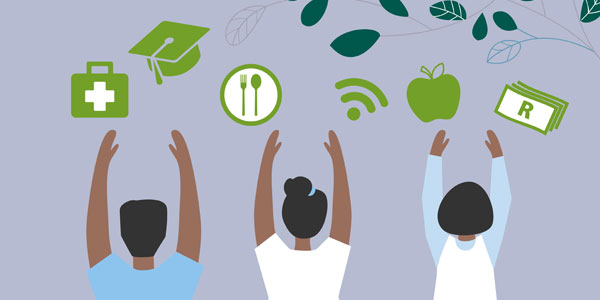
Think big to heal South African society
- Beth Amato
The ructions caused by the pandemic are an opportunity to reconsider core values and spending priorities to address our social ills.

Words are insufficient to capture the economic and social tragedies in South Africa. Fifteen million people in this country (of the almost 60 million) have little or no income, says Lee-Anne Bruce, Head of Communications at the Centre for Applied Legal Studies (CALS) at Wits University. And while short-term social care measures brought about by Covid-19 were ‘pro-poor’, the money has never been enough and its distribution bungled.
In June 2020, 37% of people ran out of money for food. Seventy percent of adults live below the Upper Bound Poverty Line of R1 268 per person per month.
In this neck of the woods, we prefer to bail out a failed national airline carrier rather than feed people.
Reduced social assistance a slap in the face
“The special caregiver grants, which especially supported women and children, were brought to an end in October 2020. At the same time, government announced a bailout for South African Airways that would have covered another three months’ worth of these grant payments. And now, the most recent budget has actually cut social grant funding by more than 2%,” says Bruce.
Over 18 million people – including older people, people living with disabilities and people living in poverty caring for children – depend on monthly grants. “Though the majority of these grants fall well below the food poverty line and the amounts are not nearly enough to support families, let alone lift them out of poverty, studies have shown that the child support grant in particular has an important role to play in food security and improving children’s health and education.”
This basic lack of security has real effects: during the lockdown period, domestic violence against women and children increased (although it was already unacceptably high) and other long-lasting social ills such as alcohol and drug abuse, inequality and xenophobia were exacerbated.
Continuing connectivity
Professor Shireen Hassim from the Wits Institute for Social and Economic Research (WiSER), says that inequality and poverty, exacerbated by Covid-19, is everybody’s problem. “We are intrinsically interrelated. It is not in the common interest to have people who are ill, starving and desperate.”
Ordinary people stepped up to mitigate a total humanitarian crisis in South Africa in 2020, notes Hassim. For example, the community action networks (CAN) networks, which provided food and basic supplies to hundreds of thousands of people across the country, were a vital response and can be applauded for their speed and innovation. These locally-organised networks show that people do in fact care about each other.
Of course, the scale of our current crisis is too large for government to act upon alone. Such a monolithic entity is not as agile as local responsiveness. “But community voluntary activities can be unsustainable too. What we need is to turn those solidaristic impulses into arguments for effective public services to be delivered by the state, using taxes more efficiently to ensure that people can live in dignity,” says Hassim. “The generosity of community initiatives in the pandemic shows that people can be persuaded to support redirecting expenditure.”
Migrant health and vaccine nationalism
Despite ordinary people’s shows of solidarity with those most affected by the pandemic, there remain vulnerable people, especially migrants and foreign nationals.
“Migrants have been scapegoated and harassed for a long time, but now they are essentially invisible in the eyes of South Africa’s public health system dealing with an unprecedented crisis,” says Associate Professor Jo Vearey from the African Centre for Migration and Society at Wits.
Despite the significant amount of data to help government make better decisions about migrant health, migration is not meaningfully considered in the health response, says Vearey – and she doesn’t think this will improve any time soon.
“For the most part of the last year, we’ve seen more securitisation, right-wing sentiments and so-called ‘vaccine apartheid’. We know that this is about keeping people out and throwing inclusivity out of the window.”
So how do we advocate inclusivity?
Prioritising people over profit
“I think the opening question is: what kind of society do we want now?” says Hassim. “The government must absolutely reorganise its priorities and look at ways to make better use of the budget, seriously reconsidering the merit of directing scarce resources to rescue South African Airways for example. Our budget must proceed from the premise that poor people are important too.”
In these extraordinarily difficult and fiscally constrained times, government has to make tough choices, says Dr Hannah Dawson, Postdoctoral Fellow in the Society, Work and Politics Institute (SWOP) at Wits.
“It’s not a simple matter and choices are not black and white. On the one hand, people are criticising the government for its lack of meaningful social support in these times, and on the other, it is believed that austerity and social spending cuts are the only way out of this economic mire,” says Dawson.
But there could be a workable and creative solution.
Income grant and a gig economy
Dawson poses the question: Since we’ve had a very high unemployment rate since the mid-70s, and since the world has seen the proliferation of the ‘gig’ economy, how can we build an inclusive society when jobs are increasingly unavailable and precarious?
“We’re never going to have full employment and so we have to think about other options. We have to start by asking what a meaningful life looks like for people outside of wage employment and how this can be best supported.”
Dawson, Hassim and Bruce agree that basic income support for people aged 18-59 years old is needed and it is in the common interest to have this. “This would at least provide young people in particular with more resources to engage in a life of their choosing and making. They need this to get out of the cycle of constant volatility and uncertainty,” says Dawson.
Young people are hustling as best they can to get by in South Africa. They do this by working brief stints at places like internet cafes, beauty salons, sidewalk spazas and call centres. Consistent income support is needed to address not only persistent unemployment, but the volatility of the gig economy.
The basic income grant should be made available to every single person (citizen and non-citizen) regardless of whether that person has an income. According to Black Sash, the veteran human rights organisation advocating for social justice in South Africa, and Bruce, this confers the dignity of equal status to everyone, eliminates the need for any means test or other qualification, reduces the risk of corruption and immediately ends abject poverty. “It creates the incentive for a rapid injection of expenditure into the economy as people acquire the ability to buy food and other necessities,” according to Black Sash.
Universal basic income
Black Sash says that in the urgent short term, the basic income grant could be given to those who are unemployed. In the longer term, it will provide a template for a universal basic income grant.
The proposal for the grant
Implement permanent social assistance for those aged 18-59 valued at the upper-bound poverty line, now R1 227 a month. Caregivers who receive the child support grant must qualify for this grant.
Make the Covid-19 grant increases of R250 a month permanent for all social grants.
Ensure the above provisions apply to refugees, permanent residents, asylum seekers and migrant workers with special permits.
Work towards a universal basic income
The ructions caused by the pandemic should not be put to waste. It is an opportunity to reconsider both core values and spending priorities. “Another world is not only possible,” says Arundhati Roy author of God of Small Things, “she is on her way. On a quiet day, I can hear her breathing."
- Beth Amato is a freelance writer.
- This article first appeared in Curiosity, a research magazine produced by Wits Communications and the Research Office.
- Read more in the 12th issue, themed: #Solutions. We explore #WitsForGood solutions to the structural, political and socioeconomic challenges that persist in South Africa, and we are encouraged by astounding ‘moonshot moments’ where Witsies are advancing science, health, engineering, technology and innovation.

